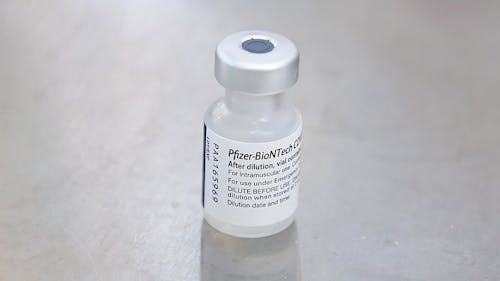U. now offering Pfizer booster shots at Ernest Mario School of Pharmacy

The University is now offering booster shots of the Pfizer coronavirus disease (COVID-19) vaccine at its Rutgers—New Brunswick vaccination site, said Rutgers Biomedical and Health Sciences (RBHS) Chancellor Brian L. Strom at a COVID-19 health briefing today.
He said that the University is currently not requiring booster vaccinations but will make a decision on the subject once more data is available. The University is also working to bring Pfizer vaccines to other Rutgers sites for the purpose of providing booster shots.
Strom discussed the current knowledge on booster shots with Jeffrey Carson, a distinguished professor in the Department of Medicine and provost at RBHS.
Carson said data shows that individuals who received a COVID-19 vaccine early on in the pandemic are experiencing an increase in infections. It also suggests that antibody levels from vaccines drop over a six-month period, which he said builds the case for booster shots.
Recent research in the New England Journal of Medicine showed that individuals 60 years old and older who had received a booster shot experienced an 11-fold reduction in serious COVID-19 infections and a five-fold reduction in overall infections, Carson said.
“I find that data compelling, and I agree completely with the (Food and Drug Administration's) decision to administer booster shots,” he said. “And yes, I have gotten one as well.”
After receiving the booster shot, individuals experience side effects such as soreness and fever at a similar rate to when they received their second vaccine dose, Carson said. After getting the booster shot, the risk of infection tends to decline the most after approximately 12 days, he said.
There is no data yet on whether a Pfizer booster shot increases efficacy among individuals who have received the Moderna or Johnson & Johnson vaccines, Carson said. But he said federal agencies are reviewing Johnson & Johnson’s submissions for booster shots and will come to a decision later this month.
In the meantime, Carson said, Moderna and Johnson & Johnson vaccine recipients can consult their physicians about getting a booster shot.
Regarding whether the U.S. should use its vaccine supply to provide booster shots for its population or distribute them to other countries in need, he said he believes the country can do both.
“We have the ability to administer … the boosters to our population here in the U.S. And we have the ability to export this around the world,” Carson said. “There's no reason that it has to be one or the other.”
Regarding the upcoming flu season, Strom said that individuals should get vaccinated against the flu to avoid simultaneous surges of both COVID-19 and the flu, or a “twindemic." He said that last year, COVID-19 masking and social distancing regulations curbed flu infection rates, but that might change this year due to areas reopening.
Although flu vaccinations may not always protect against COVID-19, Strom said they do prevent confusion between the two diseases which have similar symptoms, thus conserving treatment resources. He said that individuals can get vaccinated for COVID-19 and the flu on the same day if they would prefer.
He said that Rutgers continues to maintain a low COVID-19 positivity rate, with the most recent being 0.92 percent, compared to New Jersey’s overall rate of 4.4 percent.
“It’s clearly much safer to be on the Rutgers campus than to be going to the grocery store, even in New Jersey where it's much safer than in many other states,” Strom said.



